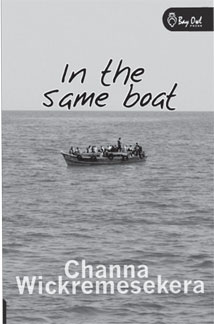Unusual literary work on boat people
A boatload of nameless refugees are fleeing their devastated
homeland, heading for an unknown destination. As a storm looms ahead of
them they run into one obstacle after another, the navy, a boatful of
rebels and a leaking petrol tank. In the meantime a stowaway is
discovered, a man from a rival ethnic group and the fugitives reveal
themselves to be more than just victims.
Then the storm breaks....
 |
|
In the same
boat
by Channa Wickremesekera
Bay Owl Press, 2010. |
The novella In the same Boat is not your usual work on boat people.
The asylum seekers from an unnamed country are cast in the role of
victims as well as perpetrators, no strangers to the gamut of feelings
people long suffering from war are vulnerable to: fear, hatred,
self-interest and greed just to name a few. What emerges is a strong
statement about asylum seekers. Boat people, we see, are also people,
possessing human emotions and qualities like love, cruelty, heroism,
greed and fear.
The context may appear to have a Sri Lankan touch but it can easily
be related to any "Third World" country. Indeed, the boatload of
refugees can be seen as an extended metaphor for any such nation, the
key actors symbolic of different elements in society. There is the "Red
Cap" who perhaps stands for the revolutionary who offers salvation but
at a price, the "Dissenter" who represents the naive sentimentality of
the well-meaning yet un-pragmatic activist, the "stowaway" the
quintessential member of the minority, tolerated because he can be
useful but expendable when it suits the general interest and of course
the nameless, faceless mob that bays for blood and screams for mercy
when it suits their interests.
Even the captain of the ship that appears in the distant, like a ray
of hope for the doomed vessel, appears to have a metaphoric function,
illustrating the limits to the humanity of the wealthy West.
The novella is replete with memorable one liners: 'Everything is fair
on a leaking boat'; 'Madame I have seen as many heroes as I have seen
orphans but they are all dead'. The final moments in the dark, stinking,
hold are terrifying, the end leaving you with a sinking feeling.
Despite some improbabilities ( a stowaway with a money belt?) the
story succeeds in making its point powerfully, leaving the image of the
ill-fated boat and its faceless yet immensely human passengers vivid in
the minds of the reader long after he has closed the book.
In the same boat by Channa Wickremesekera is currently long-listed
for the 2012 Dublin IMAPAC Literary Award.
-ADR
|

